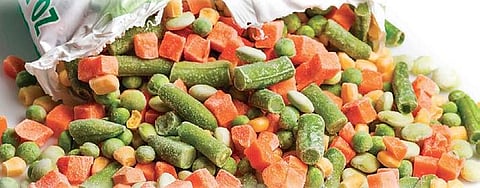

The next time you reach out for that big pack of frozen French fries, or salami or other frozen foodstuff, you could be setting yourself up for a bacteria bonanza in the stomach. Remember the migraine that robbed you of several working hours or the leaky gut that had you making a beeline for the washroom? The culprit could be in your freezer booty.
Additive Attack
Sodium-replete frozen goods tend to bring in additive agents in droves. Sodium nitrite is often added to preserve the reddish-pink colour of meat, retard the fat oxidation and cut down the risk of food poisoning.
"Having it in large quantities may increase the risk of glioma, thyroid and gastric cancers. Artificial food colouring may cause cancer," says Dr Sukhvinder Singh Saggu, Laparoscopic and Bariatric Surgeon, Apollo Spectra, Karol Bagh, New Delhi.
"The starch that betters the taste and texture of frozen items is a polymer of glucose. Your body converts this glucose to sugar. Preservatives like high fructose corn syrup present in packaged meals cultivate carcinogenic effects and diabetes. There is inflammation of the gut lining by monosodium glutamate (MSG) in frozen foods, that brings in fatigue, headache, metabolic disorders and more."
The nitrite in processed meat can turn into harmful N-nitroso compounds, most common being nitrosamines, found in abundance in processed meat.
Buy Right
Read the ingredients label. "Processed ingredients; preservatives such as trans fats, high-fructose corn syrup (HFCS), MSG, artificial colours and flavours, nitrates/nitrites, must be avoided," cautions Dr Roy Patankar, Gastroenterologist and Director of Zen Multispecialty Hospital, Chembur, Mumbai.
"HFCS leads to weight gain and diabetes when taken in large quantities. Food dyes in fast food, salad dressings, and fruit juices could lead to chromosomal damage and cancerm. Many frozen foods are high in saturated fat, added sugars, and salt. Avoid these as they can raise your blood pressure and lead to water retention," he adds.
Instead, get more dietary fibre, Vitamin D, calcium, iron, and potassium into your diet, according to Ryan Fernando, Nutritionist and Founder, Qua Nutrition. "Avoid TG enzyme, a food additive that triggers leaky gut," he says.
Storage is Everything
Frozen food is harvested at peak ripeness and flash-frozen within hours. Never thaw the food on the counter, always in the refrigerator. "This is because bacteria grow and reproduce faster at room temperature. Remember, bacteria are most active between 40°F and 140°F, but they don’t die below 40°F. Instead, they become inactive. If you plan to freeze food, always use proper storage bags, air-tight ones being the best," says Fernando.
While buying frozen goods, read the label and aim for 5 g fibre/ 15 g protein/less than 600 mg sodium
Purchase plain frozen vegetables. Try to season them yourself.
Choose unsweetened, 100 percent frozen fruit. Avoid foods with added sugar.